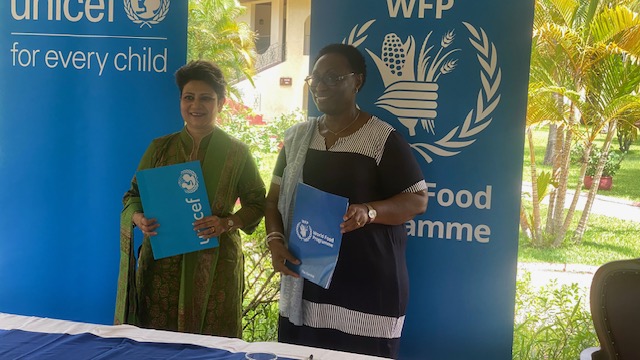By Ndey Sowe
The United Nations Children’s Fund (UNICEF) and the World Food Programme (WFP) have signed a new Memorandum of Understanding (MoU) to intensify efforts in combating all forms of malnutrition in The Gambia, particularly among children under five, pregnant women, and breastfeeding mothers.
The agreement, signed on Wednesday, 13 August 2025, signifies a stronger commitment to joint action in nutrition, food security, and resilience building. It also reinforces the agencies’ collaboration in emergency preparedness and response, ensuring that national and subnational systems can respond swiftly and effectively to the needs of the most vulnerable during crises.
Under the MoU, UNICEF and WFP will coordinate efforts to improve water, sanitation, and hygiene (WASH) facilities in schools, raise awareness on climate change, promote climate action, enhance social protection, drive social and behavioural change, and advance gender equality. The agreement also calls for joint advocacy, the development of proposals, and the delivery of integrated services to improve the wellbeing and resilience of communities at risk.
“Partnership is our greatest force multiplier, and when we join hands, the lives of children, women, and the most vulnerable change for the better,” said Ms. Nafisa Binte Shafique, UNICEF Representative in The Gambia.
She described the agreement as a bold step forward in supporting government-led humanitarian action, preparedness, and system strengthening. “Our mission is clear: end all forms of malnutrition, confront food insecurity, and build resilience so shocks do not become crises. No child under five, no pregnant or breastfeeding woman or girl, no vulnerable community should be left behind,” Ms. Shafique added.
WFP Country Director in The Gambia, Ms. Miranda Sende, said both agencies share a strong commitment to ending malnutrition through early prevention, detection, and treatment. “Addressing malnutrition in The Gambia is vital and will form the basis for our continued joint efforts in tackling malnutrition, food insecurity, and emergency preparedness,” she said.
“This agreement reinforces our commitment to strengthening national capacities, advancing data-driven nutrition responses, and ensuring that the most vulnerable people, especially children, receive the care and protection they deserve,” Ms. Sende added.
UN Resident Coordinator Mr. Karl-Frederick Paul welcomed the MoU as a key milestone in the UN’s work in The Gambia. “It reaffirms the agencies’ commitment to combine their strengths and expertise to fight all forms of malnutrition while laying the foundation for broader cooperation in areas such as education, climate change, and social protection,” he noted.
Recent data underscores the urgency of the initiative. The Gambia National Food Security and Nutrition Survey 2024 shows that 24% of the population is food insecure, with 2% facing severe insecurity. The Nutrition Sentinel Survey 2024 reveals that global acute malnutrition among children aged 6–59 months stands at 8.8%, while chronic malnutrition is as high as 17.8%.
With the MoU now in place, UNICEF and WFP are set to deepen collaboration, ensuring that the fight against malnutrition is targeted, coordinated, and leaves no vulnerable group behind.


















